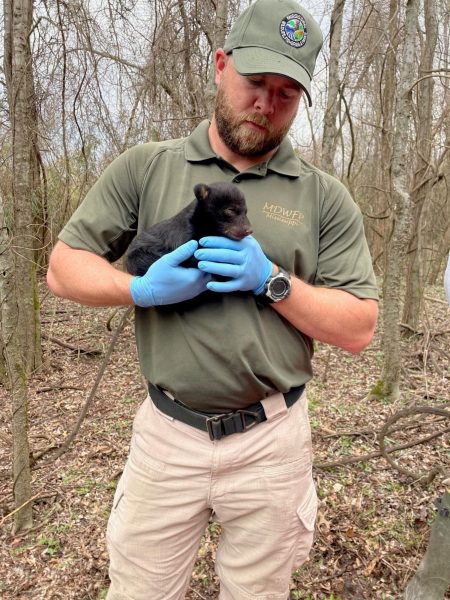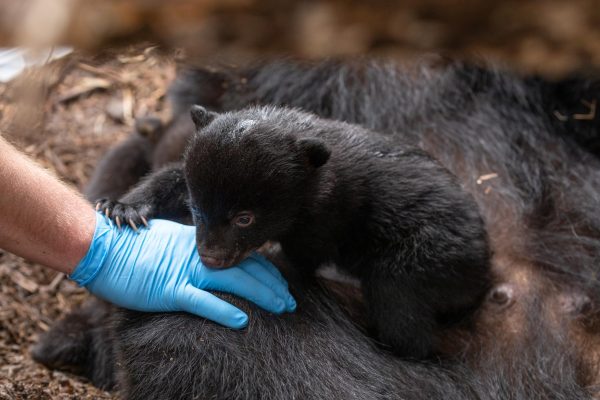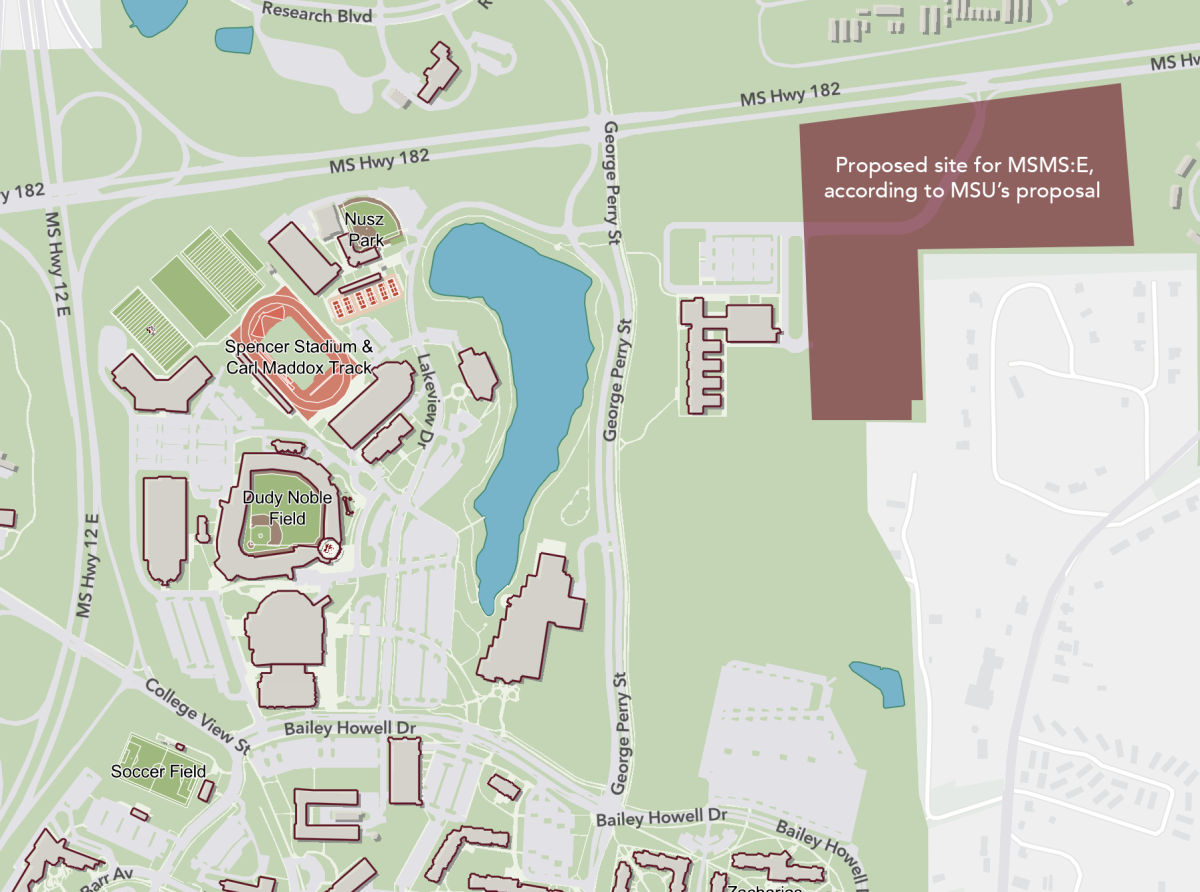On a cool morning in March, Black Bear Program Leader for the Mississippi Department of Wildlife Fisheries and Parks Anthony Ballard, hung from a rope 50 feet up an old cypress tree. He braced himself against its trunk and peered into a cavity, tranquilizer pistol in hand. Nestled 10 feet back down inside the tree, he identified the female and her cubs. He aimed – taking care that the bear and her cubs would not be harmed once the sedative took hold – and fired.
After the female was sedated, the team moved quickly to monitor her vitals, supplementing her with additional oxygen. They ensured the fit of the female’s GPS collar and lowered the five-week-old cubs down to a ground team that makes health examinations, taking tissue samples and inserting microchips. The cubs are hoisted back into the den, and the female is given a sedative reversal. Within 30 minutes, the female wakes and the situation returns to normal.
These “den checks,” evaluations of female black bears’ reproductive success and health, are Ballard’s focus during March, one element of a collaborative program between the MDWFP and Mississippi State University to monitor Mississippi’s growing black bear population.
“We’re hoping that the black bear continues along the trajectory that so many other wildlife species have, from a small population to now something that’s ubiquitous and a well-accepted game species,” Ballard said.
At the time of the program’s inception in 2002, less than 50 bears resided in Mississippi. While an accurate estimate of their current population is still being researched, Ballard said that the black bear population has “far more than tripled” since then.
“We’ve got 22 bears on-air right now. And so, the old, outdated estimate is 150 to 300. Well, there’s no way we’ve got 10% of the entire population of Mississippi with collars on,” Ballard said.
Successful black bear reintroduction efforts in Louisiana and Arkansas have led black bears to expand into Mississippi. Male bears travel further distances than female bears and have been sighted in Mississippi for decades, but an increase in reproducing female bears, as seen in den checks, could imply a future population spike for the Mississippi black bears.

2012 MSU graduate Ballard became director of the program last year. From August to January, Ballard trapped 13 bears in a custom bear trap, many of which were collared with a GPS tracking collar. Once black bears emerge from their dens this summer, Ballard plans to collar ten more and release them for research.
“We get a lot of information from collars. Number one, we get home range. Number two being habitat selection – things in the daily life of a bear are recorded,” Ballard said. “Once you get enough of that information built in, how home ranges might overlap, then you can start looking at, ‘Well, if there’s this much overlap between bears, and there’s this type of habitat selection, what might the population be based on the way they’re using certain landscapes?’”
When these bears are trapped, hair samples are collected to be analyzed by Dana Morin, professor and lead researcher at MSU’s Carnivore and Population Ecology Lab, and her graduate students. Additional hair samples are collected from “hair snags” that capture a few hairs from passing bears.
“From that we extract DNA – we have a lab around the corner that specializes in extracting DNA,” Dana Morin said from across her office desk in Thompson Hall. “And we’re able to identify the individuals that left the hair there, which is really useful for figuring out if bears are moving from Arkansas to Louisiana, or Louisiana to Mississippi, and it allows us to begin to build population models to get estimates of how many bears are in Mississippi.”
Morin and her team expect to have estimated population data in the next year. The genetic research is largely funded by the National Fish and Wildlife Foundation, which has given grants across the Mississippi Alluvial Valley to restore forested wetland habitat. One of the target species to monitor the success of this habitat restoration is the black bear.
Lindy Gasta, a master’s student working with Morin, has performed dozens of black bear den checks across the country. She is collaborating with state agencies across the Lower Mississippi Alluvial Valley to identify differences in movement behavior between colonizing and established bear populations to better understand what the edge of bear population expanse looks like.
“My research has two components. The first one, I’m actually completing a density estimate for the lower Mississippi alluvial Valley. So that’ll include the populations in Arkansas and the populations in Louisiana and Mississippi,” Gasta said. “The second component is looking at male movement data. We’re comparing established populations and recolonizing populations so I’m utilizing collar data and actually genetic data to look at it on two different scales.”
Spencer Daniels, a second-year master’s student from Madison, Mississippi, worked with Ballard during this year’s den checks, either as a darter or when handling the cubs. His research with Morin is focused on using hair samples to measure cortisol levels, to examine how stress impacts female black bears’ reproductive success.
“I’ve learned a lot and I want to hopefully end up being a bear biologist one day, so this is a great experience for me getting to actually get out there in the field and do some stuff alongside bear biologists,” Daniels said.

Ballard said the second component of the MDWFP Black Bear Program is public outreach to prepare Mississippi residents for the arrival of black bears in their area.
“As the population of bears grows in Mississippi, so will the interactions between people and bears. We want to make sure that’s smooth and that people are educated on the front end about how to live with bears and how to deal with bears,” Ballard said. “If people have a baseline understanding of how to avoid conflict, how to put your pet food up, take your garbage cans out the morning of instead of the night before, you know, those little small practices that that people can build into their daily habits – doing that on the front end is going to avoid a potential conflict whenever they do have bears in their area.”
Ballard recommended visiting Bearwise.org for more information on black bears and safety tips. Individuals can contribute to the understanding of black bears in Mississippi by reporting sightings to the MDWFP to be recorded on its black bear observation map.
The successful conservation of black bears in Mississippi is fueled by wildlife restoration funds produced by license sales and the purchase of hunting equipment. The MDWFP is hopeful that the Black Bear Program will continue to progress into the restoration of the black bear as a game species.
“The story that I try to tell is that this is a native wildlife species that was at the brink of extinction, that used to be an important game species back in the early 1800s and 1900s,” Ballard said. “What we would like to see as an agency is for that species to come back in healthier numbers where they can support a hunting season, and the residents of Mississippi can enjoy that resource again, just like they did back in the days of Teddy Roosevelt.”


















